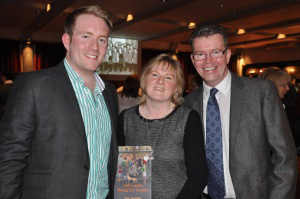‘Irish London during The Troubles’

Seán Sorohan. with his parents, Joanna and Peter image: Luke Teague
“They were going back, that was the theory; they were going back sometime when things were better.”
A fascinating new book on Irish experiences in London between the 1960s and 1990s was launched in London on 16 October. More than 100 people attended the launch at Camden’s Irish Centre of ‘Irish London During The Troubles’ by Seán Sorohan. It is the first book of the 25-year-old writer from North London, the grandson of four Irish emigrant grandparents who took the boat to England in the post-war decades. In the front row at the launch was his parish priest, Fr Martin Hayes from St Anthony’s Parish in Edgware. Sean is a former head boy of Finchley Catholic High School and he studied Irish history at Queen’s University in Belfast.
“Being Irish in London was like living in another county, but outside Ireland” said the first speaker, Robert Mulhern of the Irish Post newspaper. He said Sean “deserves great credit” for capturing the real stories of the Irish in Britain and relaying what the author feels himself about being second generation Irish in Britain. The second speaker, Conor McGinn of Labour’s Northern Ireland team at Westminster, felt he book was an important one, “not a political history, but a lived version of what people went through here”. He reflected that although he calls London home, after arriving from Armagh ten years ago, “I have never stopped missing my home village”. He felt the book demonstrates the solidarity and love within the Irish community and the way it has faced challenges, particularly during The Troubles. “Of course, my generation too have had to leave Ireland for work” he added.
The Irish are London’s biggest ethnic minority. The book contains original interviews with 24 emigrants from Ireland, 11 London-born Irish and three priests who ministered to them. The Irish who came to London in the 50s and 60s largely involved themselves in “the same spheres of Irishness”, such as the Gaelic Athletic Association, county associations, Irish dance halls and the Catholic Church. One interviewee described the Sacred Heart Parish in Kilburn as “a meeting place” and “a real Irish church with great priests”. The Westminster Diocese contributed to the notion of ‘Irish parishes’ by placing Irish priests in parishes with large Irish congregations. Yet, a constant theme of Irish Londoners born in Ireland has been a sense of exile and a “myth of return”. However, Sean points out that the passage of time and visits back made the London Irish realise they were no longer fully at home in their old communities.
In his chapter on ‘The Troubles and Irish London’, Sean notes that many Irish and Irish organisations opted to keep out of politics in what has often been described as a ‘heads down’ attitude. Columban priest Bobby Gilmore, who started work with the Irish Chaplaincy in London in 1979, told Sean he was amazed by the lack of attention paid to such as the operation of the Prevention of Terrorism Act and anti-Irish incidents. Sean concludes the chapter by saying that, “while the shock of internment and Bloody Sunday briefly brought the Irish on to the streets of the capital… the horrors of the IRA campaign, particularly when it struck Britain, caused re-evaluation of traditional nationalism and made them far more cautious about expressing sympathy for any nationalist cause”. A theme that emerged from interviews was that Irish jokes, stereotyping and harassment were far more prevalent in the 1950s and early 1960s than anything experienced during The Troubles.
Sean and his parents were born and raised in London, but he was so certain at the age of four that he was Irish that when a catechist at his local parish asked the young children if any were not from England, he proudly put up his hand. He was stumped when the catechist asked: “Do you know if you came here by boat or by aeroplane?” He says “the ensuing identity crisis over the next two decades eventually led to this book”. In his final chapter he explores the experiences of ‘The Second Generation in London’, who spent their childhood and young adulthood within an Irish community that formed through residential areas, churches, schools, cultural activities and dance halls. For some, they only felt English when they visited Ireland and were described as ‘Plastic Paddy’ by relatives mocking their English accents. There they were also accused, as one interviewee said, “of being locked into a particular caricature of Irish, you know the half doors and the thatched cottages and cutting the turf”.
At the launch, Sean said he hoped the book would “help Irish people reminisce about their experiences in London”. While he spoke, a backdrop of family images of holidays in Ireland, Church events, and Irish dancing competitions certainly had many in the hall reflecting on their own family histories as part of London’s Irish community. He was delighted that the venue was the Irish Centre in Camden, which was “a centre created so that the Irish could feel at home in London”. He also noted that the capital’s Irish community has changed from being primarily an immigrant group oriented towards Ireland to one where there is a larger number of London-born Irish, firmly rooted in Britain but proud of their rich Irish heritage.
‘Irish London During The Troubles’
By Seán Sorohan, Published by Irish Academic Press
Copies can be obtained from:
www.amazon.co.uk/dp/0716531038/ref=cm_sw_r_fa_dp_BdDrqb0JJK
















